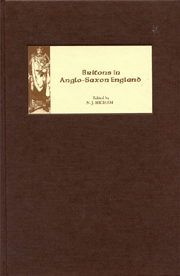Book contents
- Frontmatter
- Contents
- List of Illustrations
- List of Tables
- Contributors
- Dedication
- Acknowledgements
- Abbreviations
- 1 Britons in Anglo-Saxon England: An Introduction
- 2 Anglo-Saxon Attitudes
- 3 Forgetting the Britons in Victorian Anglo-Saxon Archaeology
- 4 Romano-British Metalworking and the Anglo-Saxons
- 5 Invisible Britons, Gallo-Romans and Russians: Perspectives on Culture Change
- 6 Historical Narrative as Cultural Politics: Rome, ‘British-ness’ and ‘English-ness’
- 7 British Wives and Slaves? Possible Romano-British Techniques in ‘Women's Work’
- 8 Early Mercia and the Britons
- 9 Britons in Early Wessex: The Evidence of the Law Code of Ine
- 10 Apartheid and Economics in Anglo-Saxon England
- 11 Welsh Territories and Welsh Identities in Late Anglo-Saxon England
- 12 Some Welshmen in Domesday Book and Beyond: Aspects of Anglo-Welsh Relations in the Eleventh Century
- 13 What Britons Spoke around 400 AD
- 14 Invisible Britons: The View from Linguistics
- 15 Why Don't the English Speak Welsh?
- 16 Place-Names and the Saxon Conquest of Devon and Cornwall
- 17 Mapping Early Medieval Language Change in South-West England
- Index
5 - Invisible Britons, Gallo-Romans and Russians: Perspectives on Culture Change
Published online by Cambridge University Press: 12 September 2012
- Frontmatter
- Contents
- List of Illustrations
- List of Tables
- Contributors
- Dedication
- Acknowledgements
- Abbreviations
- 1 Britons in Anglo-Saxon England: An Introduction
- 2 Anglo-Saxon Attitudes
- 3 Forgetting the Britons in Victorian Anglo-Saxon Archaeology
- 4 Romano-British Metalworking and the Anglo-Saxons
- 5 Invisible Britons, Gallo-Romans and Russians: Perspectives on Culture Change
- 6 Historical Narrative as Cultural Politics: Rome, ‘British-ness’ and ‘English-ness’
- 7 British Wives and Slaves? Possible Romano-British Techniques in ‘Women's Work’
- 8 Early Mercia and the Britons
- 9 Britons in Early Wessex: The Evidence of the Law Code of Ine
- 10 Apartheid and Economics in Anglo-Saxon England
- 11 Welsh Territories and Welsh Identities in Late Anglo-Saxon England
- 12 Some Welshmen in Domesday Book and Beyond: Aspects of Anglo-Welsh Relations in the Eleventh Century
- 13 What Britons Spoke around 400 AD
- 14 Invisible Britons: The View from Linguistics
- 15 Why Don't the English Speak Welsh?
- 16 Place-Names and the Saxon Conquest of Devon and Cornwall
- 17 Mapping Early Medieval Language Change in South-West England
- Index
Summary
SINCE the 1980s a new consensus has emerged in British early medieval archaeology according to which a substantial proportion of the native Romano-British population survived into the Anglo-Saxon period. This view is usually associated with a ‘minimalist’ perspective on the Anglo-Saxon immigration. It is also worth pointing out that this new consensus is mainly based on new thinking, not new evidence. The key problem for this new consensus has been the near-invisibility, in archaeological terms, of the postulated sub-Roman, British population. This is, of course, one of the main reasons why the traditional ‘ethnic cleansing’ model, derived from the written sources, has persisted for so long in Anglo-Saxon archaeology.
The aim of this paper is not to support any particular model of post-Roman population stability or change, but rather to explore the nature of post-empire culture change and its implications for archaeology. The approach is theoretical and comparative: a recapitulation of the nature of the archaeological problem, complemented by comparative observations from Gaul, and followed by a discussion of a modern case of ‘empire collapse’ and its consequences for material culture, settlement patterns, and other aspects relevant to the archaeological debate. The focus here will be entirely on material culture because other types of evidence will be covered by other contributors to this volume.
- Type
- Chapter
- Information
- Britons in Anglo-Saxon England , pp. 57 - 67Publisher: Boydell & BrewerPrint publication year: 2007



